‘Bates Motel’ Season 4 Finale Postmortem: Kerry Ehrin and Nestor Carbonell Talk the Big Death, Normero, and the Romero-Norman Feud
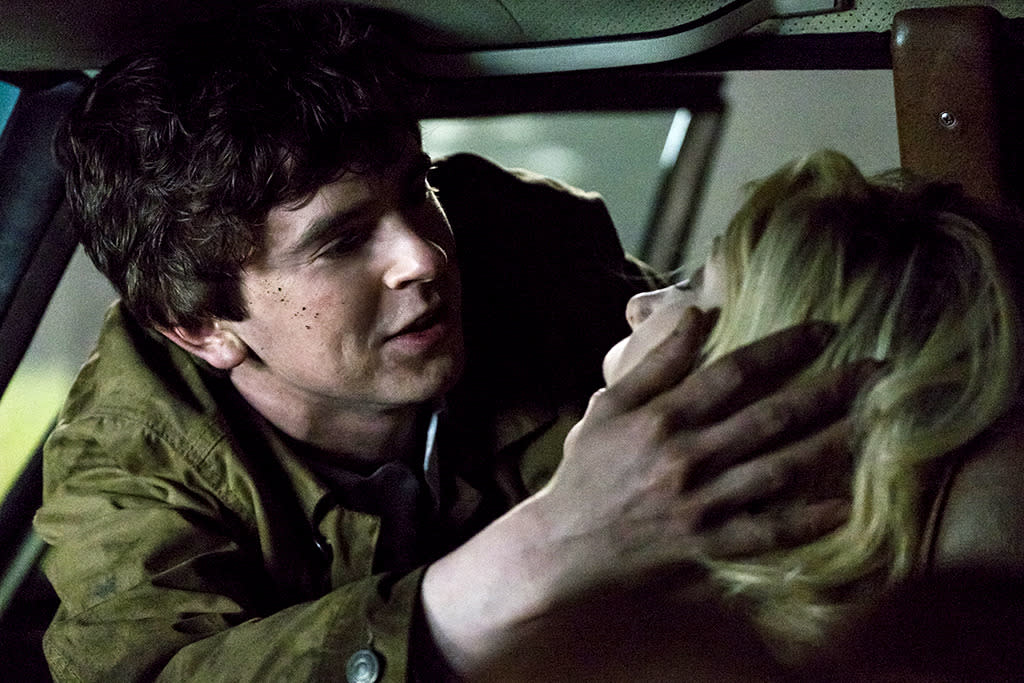
Warning: Storyline and character spoilers ahead for the “Norman” episode of Bates Motel.
She’s gone. She’s really gone. Norma Louise Bates is really dead. Her son, Norman, really killed her in a murder-suicide attempt. And then, he really dug up her body, took it home, glued Dead Norma’s eyes open, and apparently plans to go full psycho — and Psycho — and keep his Mother by his side for all time.
With just one more season to go, Bates Motel ended Season 4 at a place a lot of fans might have expected for next year’s series finale. Showrunner Kerry Ehrin and star Nestor Carbonell — whose Sheriff Alex Romero is crushed by the loss of wife Norma, and homicidally furious at his stepson — talked to Yahoo TV about the heartbreaking loss of Norma (but not star Vera Farmiga), about who else is likely to return for Season 5, about the dark humor running through even this tragic episode, and about how they’re both happy “Normero” fans got their happy ending before their tragic one.
You guys really did it. Obviously, we’re all very sorry that Norma is dead, but no trickery… she’s really gone.
Kerry Ehrin: Yeah, definitely. It was a horribly hard thing to do from a creative perspective… I was saying the other day, I’ve spent more time with Norma over the last four years than any of my friends. It was really hard. It was really heartbreaking. [Executive producer Carlton Cuse] and I both just got really emotional writing episode 9. Then faced with the task of writing the finale, I was so sad, and honestly grieving. I know that sounds insane. It was just all wrapped up in my head with Vera. It was very hard. The way that I dealt with it, I just climbed inside of Norman. I just got right inside of him and just got into the denial. Once I was inside of that, it started to get funny, which was so interesting to me. Because it really is a bizarre predicament if you believe, if you know someone is not dead, but everyone else thinks she is dead, but you know you have to keep the secret for the supposed dead person. It started to just kind of take on a life of its own that allowed humor, and really, I think, took you on the ride with Norman, which was the ultimate goal. If you’re grieving for Norma, no one is grieving more than Norman. You’re going to kind of get on that train with him so that by the end, when she turns around from the piano, you’re going to be feeling exactly the same thing he is. That was the hopeful goal.
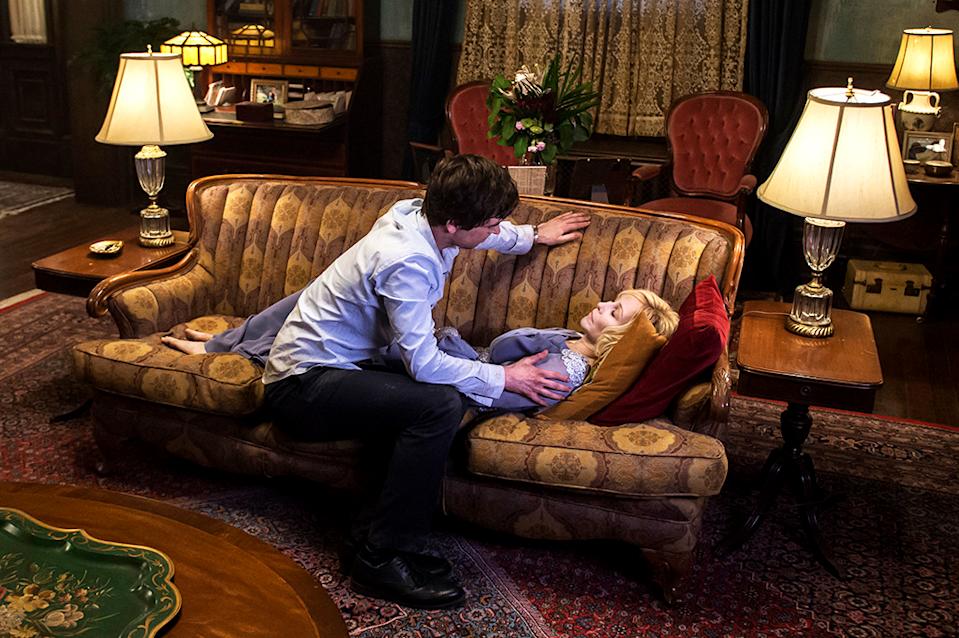
The first thing I think everybody is going to wonder about is whether Vera will be back. In any other situation, you could maybe only do flashbacks, but the beauty of this story is that she can be there just as much as she was when Norma was alive, thanks to what Norman is going through.
Ehrin: Yes, Vera is going to be fully present. We’re really excited about the idea of unleashing a character that is, yes it’s a hallucination, but I mean, think of how you feel about Norma dying. In a way, that’s a hallucination, too. It’s like Norma has become very real to people, but she’s not real. The goal will be to get the people again on the ride with Norman to invest in this hallucination as a real, multi-layered, surprising, outrageous person with many layers and many twists and turns that you do care about. She is an aspect of him, and hopefully we will care about him.
When you think about Season 5, obviously the show up until Norma’s death has very much been Norma and Norman’s story. Will Season 5 then, is that more Norman’s story?
Ehrin: Honestly, I feel like, no, it isn’t. Since the beginning when Carlton and I first talked about it, we wanted to, instead of doing the Mother as like a horrible shrew who was abusive, we wanted to do a kind of sad, beautiful, co-dependent love story between a mother and a son. That obsession with Norma will absolutely drive the final season and really keep her exactly in the center of it, not only for Norman but for Romero. It’s a big love story. When someone dies you don’t just forget them. They still can drive your life.
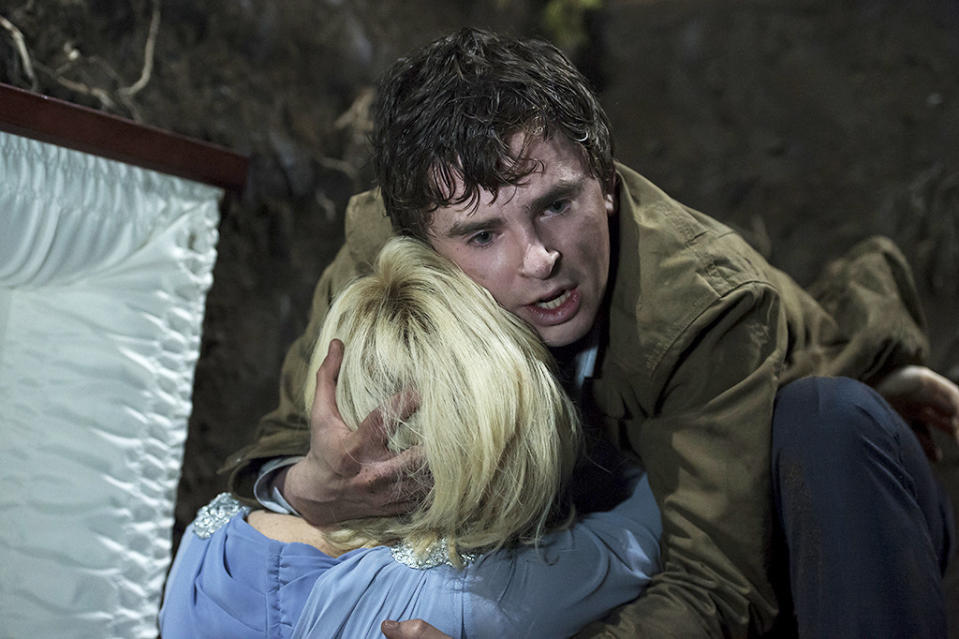
This establishes a new story, a new method for how Norma died versus how she died in the original Psycho movie. Will there be a lot more of that in Season 5, setting new canon for the Bates universe?
Ehrin: Yeah, the goal of it, and in many ways the fun of it, is to take some of the wonderful, iconic elements that exist in Psycho and weave through them, but without redoing them. It will definitely be our version of it. We will go through it in a different way. We will visit Psycho in a different way.
Nestor, Kerry just talked about the love story, and one of the sweetest scenes in the finale is when Alex goes to the morgue. A lot of people would be creeped out to do that, but he goes in, and he kisses her, and he touches her so gently, and he puts the ring on her finger. It seemed very symbolic of how Romero has accepted Norma and loved her and didn’t judge her despite all the really crazy things he knows about her and her life, the situation with her brother, and other things that would have scared a lot of guys off.
Nestor Carbonell: Oh, thank you. I mean, Kerry wrote a beautiful scene. It wasn’t much in terms of dialogue on that, but it didn’t have to be. As you pointed out, it was basically a feeling, maybe in some ways a sense of physical closure. He had to see her and had to make sure he honored his love for her, and that he knew that in that note that she wasn’t speaking the truth. Yes, she will always love him, but that it wasn’t a suicide. He knew that and that was sort of, I guess, him putting the period on that sentence, by putting the ring on her finger again and declaring his undying love for her. I think you’re right, I think he has accepted her, even knowing all of her history, and maybe because of her history, knowing how tragic her life had been. He felt some connection in that way, because he himself has had a tragic upbringing. They connected on some level through their past, but also, obviously through their character. They’re both strong-willed, they have their own set of principles and convictions, and they’re not about to just go with the flow. These are both characters who are strong characters. He felt, in a weird way, that she might have been his female counterpart, and I think vice-versa.
Ehrin: That was beautifully said. That made me cry, Nestor.
Carbonell: Oh, sorry about that. Thank you, you made me cry. I got you back.

You mentioned, Nestor, the ring. It was very important for him to put that back on her finger. He has many reasons to be upset with Norman, he’s furious at him, but when Norman is being such a jerk in the church — there’s just no other way to put it when he’s shoving that ring back at Romero — is that the thing that really kind of sets him off and seal his desire for revenge?
Carbonell: Absolutely, certainly in that moment. I think he was going there to mess Norman up regardless. That certainly was the match on the lighter fluid. He was going there to do some damage. I don’t know if [Romero] knew that he was going to beat him up there or kill him, but he was going to confront him and try, at the very least, to get a confession out of him, because he wants to put him away. After that whole scene, he’s resolved to basically kill him, which is why he goes back to his office to get his gun. The ring is beautifully symbolic in that it is this power play between her two lovers. It’s Norman on the one hand and Romero on the other. It’s a great device, a great back and forth that Kerry introduced, and also, it’s a family heirloom. The ring is from Romero’s own mother, so there’s that mother play there, as well. It’s just enormous disrespect on Norman’s part. It’s a beautiful way to demonstrate the power play between these two guys. It was a lot of fun to shoot.
And, even with all that intense drama, it was funny. Romero has that great line as he’s leaving, “I am the police, dumbass.” The “dumbass” just sealed that scene so well.
Carbonell: You wrote a beauty, Kerry. That was fun to do. We were in a church, too and I was like, “Oh, man.” I couldn’t believe we did that whole scene in a church.
Related: ‘Bates Motel’: Freddie Highmore and the Showrunners Talk That Big Death and Season 5
The scene was also so appropriately irreverent for how Romero, especially, but Norman, too, are feeling. What does any of this matter at this point? They both lost this woman they loved so much, and it felt completely fitting that that was happening there in an odd way.
Carbonell: Absolutely, all bets are off at that point. The woman that both of us would give our lives for is gone. Decorum is gone. Not that it was ever there for Romero… he’s a man who kills at will. If the wind blows certain ways, like “Yeah, you’re gone.” But certainly now, all bets are off. Regardless of the setting, whether it’s a church or not, he’s going to do what he’s going to do.
When Romero went back to his office to get the gun, do you think he intended to kill him or frighten him into confessing? Which was more important to him, that Norman die or that he confess?
Carbonell: I think Romero and Nestor wanted to kill him. No, I don’t know, you tell me, Kerry. What was your intention?
Ehrin: He was going to go kill him.
Now the DEA has finally got something on Alex. I think he’s too clever, and knows the town too well to be taken down by a perjury charge. He’s also very motivated by his desire to get vengeance on Norman. Can we assume that he’s going to extricate himself from the situation at least long enough to do that in the final season?
Ehrin: Yeah. We can assume he will be dealing with it.
Related: 10 of TV’s Most Manipulative Moms
Poor Dylan. Is anyone going to tell Dylan that Norma is dead? Because he has some key information, Audrey’s earring, that Romero would certainly be very interested in.
Ehrin: No. We very carefully stretched Dylan’s emotional arc. He is truly fed up. He is truly fed up with his mother, and he is in a horrible situation where he basically has no solid information. It’s something his gut is telling him. He can push forward on it and break his mother in half and have his brother committed, possibly. He’s always third man out, so it’s like the combination of all those factors and the fact that he found someone that he loves, where it’s actually a healthy relationship. He wants to go live his life and be unfettered with the guilt and the worry and the trying. He really cut himself off. Stuff happens in families where there’s a bad break and people just don’t communicate with [each other], and it’s a terrible thing for no one to tell him, but also, Norman’s hands are tied.
During their phone call, Dylan was leaving a little wiggle room open to keep in contact with Norman, who rejects it. At that point, is Norman kind of thinking ahead to the fact that he’s going to be living alone, isolated with Dead Norma?
Ehrin: Yeah, on the surface. I think on a deep level, Norman is just terrified out of his mind. He thinks it’s impossible to really comprehend how scary the concept is that his mother left him. It’s so terrifying to him, he’s like a six-year-old. It’s like he can’t let it in. He has to pretend she’s alive, and he has to pretend that this is like the mandate, that’s she’s going to pretend to be dead, and he has to support it. It isn’t just about the incident or what he’s saying or the premise of the lie, it’s about deep inside him, the utter panic and terror he is feeling throughout this episode, the vulnerability.
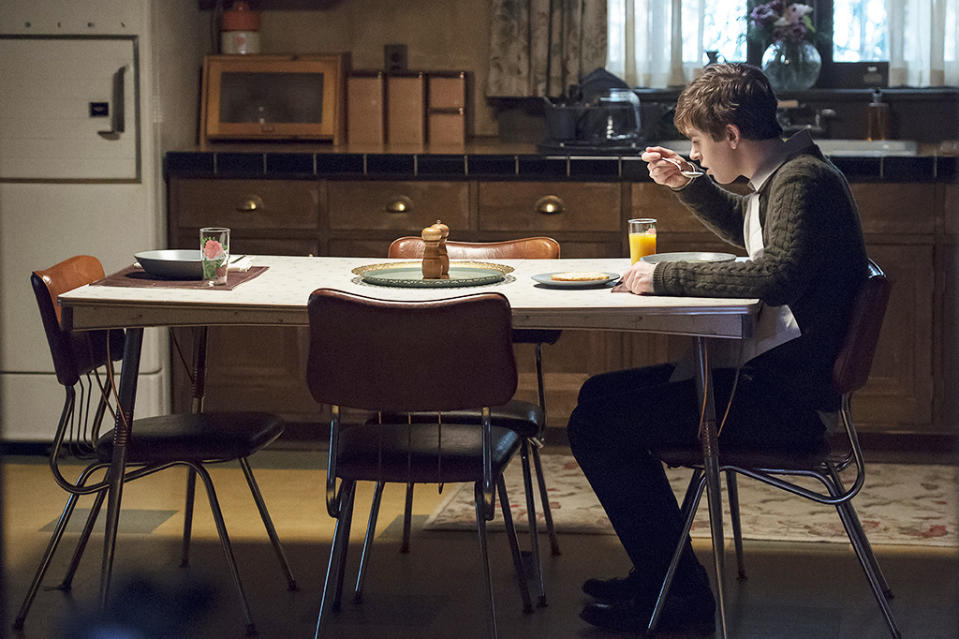
We have to talk about the eyes. How did that whole scene work?
Ehrin: I don’t know, will it ruin it? They’re actual dead eyes, contact lenses. Yeah, they’re these super cool contact lenses that you use for stuff like this.
That’s actually Vera lying there with her eyelids kind of held open somehow?
Ehrin: Yeah. Well, she did that herself. I have to tell you, Vera is the most fu*king committed dead person you will ever come across. I have never seen anyone work so hard and so beautifully at being dead. It really is like she goes into a different place. She gets so still, and she can hold herself so still. It kind of blew me away, actually, because I was on set for a lot of time and she really feels dead when she’s doing those scenes.
Carbonell: She’s pretty good alive, too.
Nestor, what was your experience like when you were in the morgue with her? She was perfectly still.
Carbonell: She really was. Even though an incredible production design team built that whole morgue, and they did such an amazing job, it was really creepy walking into that. I think it was the last scene we shot that day, and knowing that she was in a drawer, that Vera was in a drawer and having to pull her out… Because of our incredible art department, the way that the motel is built, we walk in and the sets are so incredibly real and beautifully designed. We walk into these sets and, as an actor, you don’t have to go too far in terms of your imagination, because you really feel you’re there. That morgue felt really real, and knowing she was in a drawer felt extremely real and painful. What Kerry said rings true for all of us. I know that the crew was emotional. I certainly was emotional even reading it on the page, and then getting to the set and having to do those scenes. It was emotional for all of us, we’ve all fallen in love with Norma. That’s a credit to Kerry and obviously to Vera, as well. They both have realized this incredibly tragic and beautiful character.
Chick’s scene was another great moment, but also important because it seemed like he, at least for a moment, shook Norman out of the pretense that Norma is dead. He definitely saw Norma’s body, right?
Ehrin: Yes. The great thing about that character and about the brilliance that is Ryan Hurst is he can play this guy that has this bizarre moral compass, this philosophical, meandering mind, who can then kind of embrace things at different points when he needs to. He’s also somewhat emotionally disconnected, so the fact that he could walk in there, see that, assess it, not judge it and kind of give Norman some guidance, was just such an invaluable tone in that moment for the storytelling. Also, we love the idea that there’s someone in the world that knows what Norman is doing, but doesn’t judge him.
Will Chick potentially be back? He did promise to check in on Norman.
Ehrin: Oh yeah, we very much hope to have Ryan back. We love him.
Why did Norman flush all his pills? Was it because he sees them as a sign of what he thinks Romero was trying to do with controlling him via Pineview and therapy?
Ehrin: No, he just longs to see his mother. He’s just like, “All bets are off. I’m panicking. I have to see her. I have to see her, I’ll take her whatever way I can get her.”
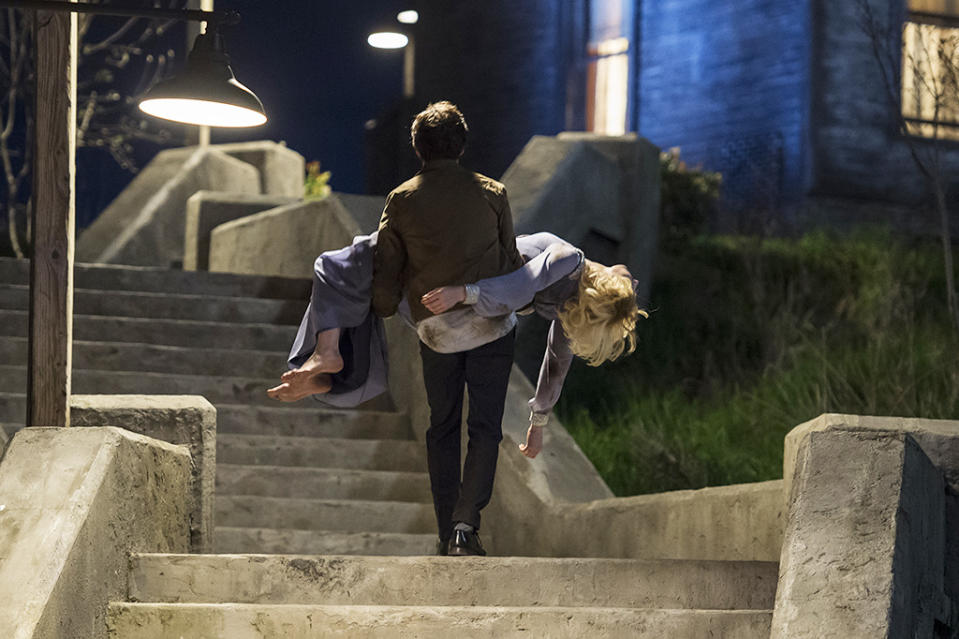
Nestor and Kerry, for you, what were the funniest scenes in this episode?
Carbonell: I particularly thought the fight was funny. It was intentionally meant to be funny. Just the way that Freddie got the ring out. It’s almost like, I think he reached into the wrong pocket. There was an uncomfortable moment that was like, “Oh wait, I’ve got to show you something that you’re really going to love to see. Oh, it’s not in this pocket, it’s in this one.” I’m waiting for him to dig something out. All those moments are funny. The line you mentioned about him being the police, dumbass. For me, certainly that scene was ripe with great writing and great humor.
Ehrin: I love all the scenes where Freddie had to pretend to other people and go along with things. Like the scene where he’s sitting in the lobby of the funeral home with the dress, and he’s kind of patting the dress like it’s a real person. Then he has to go in and plan her funeral. It’s such a dark and absurd comedy, and I thought he really hit it out of the park.
How does it feel knowing you’re going into the last season?
Carbonell: [to Ehrin] You didn’t tell me what it’s going to be like. I have no idea.
Ehrin: I think it’s going to be great for you. I think, from a story perspective… the goal, certainly from our side, Carlton, me and the writers, is to deliver a completely balls-out, end with a bang, really awesome season that is dark, that is violent, that is funny, and has incredible character stories in it.
Carbonell: For me, this has been an emotional… creatively, I don’t think I’ve been on a greater ride than this one, just top to bottom. You know, none of us know where it’s going, which is one of the great things about the writing of it. As Kerry just mentioned, it’s very much character driven. That’s obviously the best kind of storytelling, certainly from an actor’s perspective. To make decisions based on a character, there’s nothing like it. Then you add Kerry’s humor to it and all these wonderful layers to every character. It’s been a dream ride, so I can’t wait.
Nestor, no one knew at the beginning that “Normero” was going to become such a fan favorite, such a core of the show. What has that been like, to have that evolve into such an important part of the Bates Motel story?
Carbonell: How Kerry wrote it and how it developed, it was sort of a slow burn. It was one step forward, two steps back much of the way through Season 3. I love what you did, Kerry, what you and Carlton and the writers did this year in sort of forcing us together through the convention of marriage and a marriage out of convenience, then consummating the passion and then finally declaring the love. It was sort of a backwards way to find love or to admit love to each other. I thought it was really smart. Yeah, as an actor it’s always great to get to play a part in such a strongly written romance, and to work with Vera, it just doesn’t get any better than that.
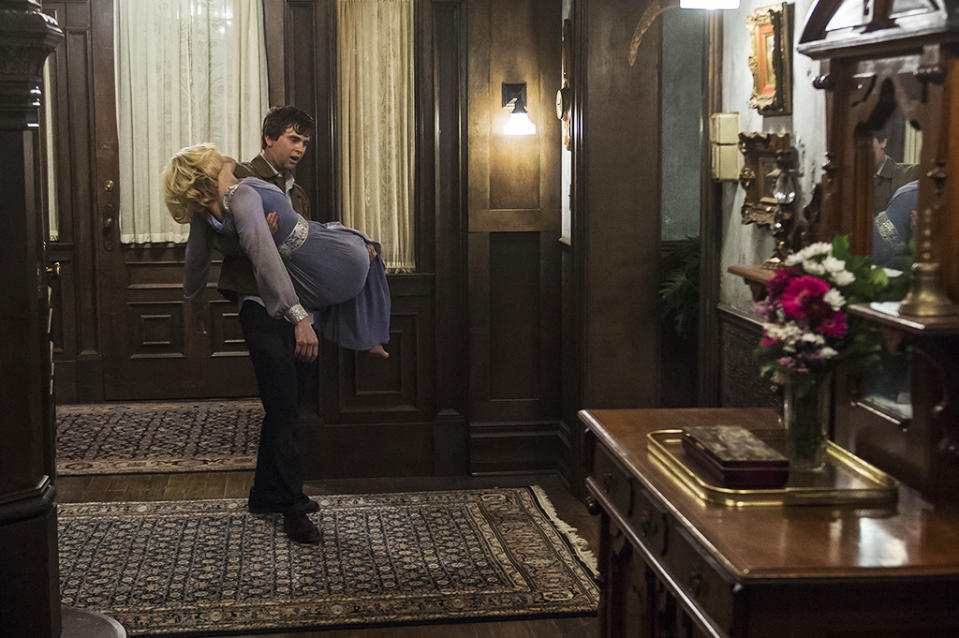
Ehrin: It was always a really fun thing for Carlton and me, too, because it really emerged out of the first season all on its own, this chemistry that they had, and the fact that she didn’t trust him, and the fact that they were both control freaks. It’s a very personally fun part of the show to me, because I so identify Carlton with Romero. He really is. He is very much the guard of Romero. He knows that character really well inside. It was fun to just kind of see that aspect of Carlton come out of the writing and then get to play it off of Norma. It kind of had such a wonderful, organic life based on the creative people doing it, Nestor and Vera, and Carlton and me in the writing. It’s always been just such a fun part of the show and such a great life-affirming part of the show, which makes us happy in a world of darkness.
As fans, we did get that. We got to see them happy. It was more short-lived than we would have liked, but we got to see them happy, Norma probably for the only time in her life, happy in that particular way, for as long as it lasted. And in a way that was very clever and organic to the storyline.
Ehrin: Honestly, just emotionally, because we really grew to love Norma and Romero so much, we wanted to make them happy before we had to take everything away. I know it sounds insane, but it’s true. That was a huge part of it … we wanted both of them to have been able to grow and find happiness. That’s really all you can ask for in life.
(Photos: Cate Cameron/A&E Networks)


